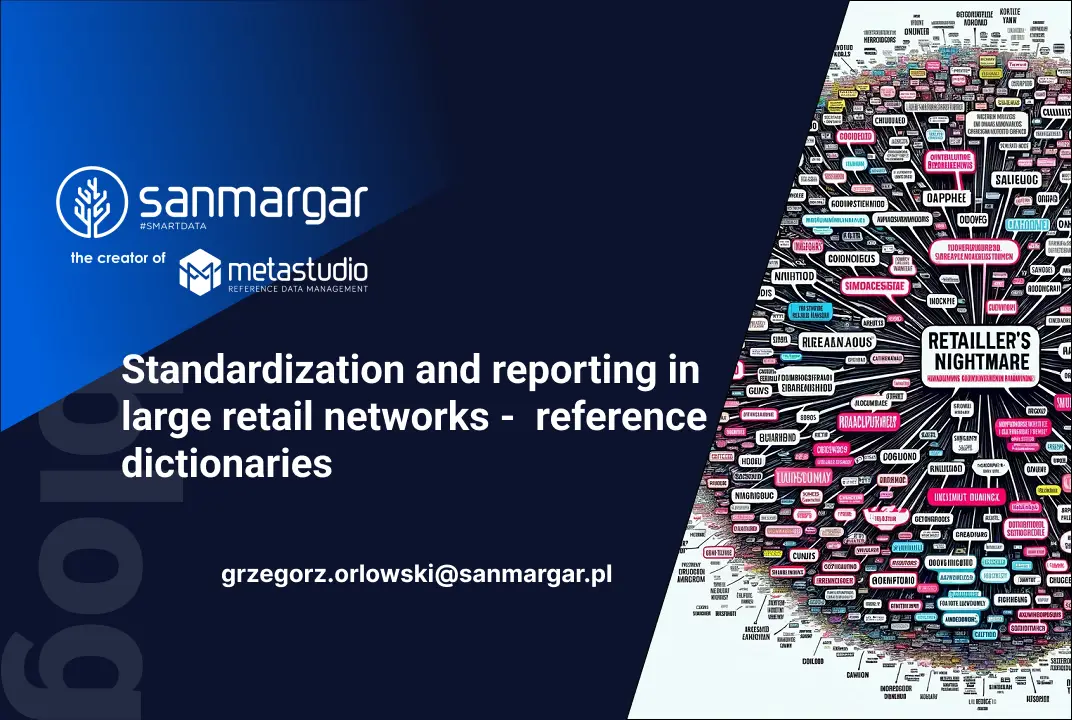An intriguing case study demonstrates how the use of metadata and Metastudio DRM-managed reference dictionaries addressed the issue of inconsistent product coding and naming within a large retail chain. The project’s objective was to enhance sales analysis, central order management, and sales reporting through the lens of the corporate catalog of products sold.
Customer Challenges
Millions of receipt items can be gathered daily into a single central data warehouse. However, the diverse coding of products across individual store systems and the customizable naming of these products render any analysis of sales by assortment groups unfeasible, as grouping the data becomes impossible. Consequently, decision-makers are left without straightforward answers to key questions, such as which products are selling well and which are not. They also lack insights into whether franchisees are meeting their obligations appropriately, including whether they are purchasing assortments they are contractually required to order from the central warehouse on their own.
Solution
The Sanmargar Team designed and implemented a solution whose main components included:
- A standard ETL class solution (in this case, Pentaho Data Integration) responsible for loading and processing receipt data.
- A data quality management solution (in this instance, the proprietary Sanmargar DQS solution was utilized) that handled data standardization and cleaning processes.
- The Metastudio DRM dictionary and reference data management solution served as a central repository for mapping, categorizing rules dictionaries, and controlling data processing
Benefits Achieved
The project has significantly improved sales analysis: Standardized and structured product data have facilitated the analysis of sales trends and the identification of the best- and worst-performing products.
The solution has enhanced control over how selected stores utilize central procurement versus local purchasing. Utilizing dictionaries to map the codifications used at cash registers to the corporate product catalogs has enabled monitoring whether franchisees comply with their contractual obligations to order assortments from the central warehouse.
Additionally, a beneficial side effect of the project was the ability to report sales in formats required by corporate headquarters, as well as in formats utilized by research, rating, and statistical agencies. Employing additional dictionaries for mapping product catalogs has allowed for the analysis of sales against reference data, providing insights into nationwide and sector-specific sales performance.
Role of Metastudio DRM
Metastudio DRM played a crucial role in the project, delivering the following advantages:
Central Dictionary Management:
- Categorization rules were centralized, significantly enhancing their management and updating process.
- Modifications were applied centrally, eliminating the manual adjustment of data across various systems.
- The standardized dictionary structure improved information accessibility and ensured consistent data across the organization.
Intuitive Interface:
- The Metastudio DRM interface is user-friendly and intuitive, enabling business users to independently manage the dictionaries without IT assistance.
- Its simple navigation and clear functionalities facilitate the addition, modification, and deletion of categorization rules.
- Empowering business users to self-manage dictionaries has heightened the organization’s adaptability and responsiveness to evolving requirements.
Dictionary Data Validation Mechanisms:
- Metastudio’s extensive range of validators, including domain consistency checks, regular expressions, and syntax verifications, allowed for rigorous validation of user-made alterations.
- These validation mechanisms guaranteed high accuracy in data processing, preemptively eliminating errors and discrepancies.
- Automating dictionary data validation has considerably streamlined processes and reduced the need for time-intensive manual verifications.
Mechanisms for Historicizing Dictionary Data:
- Metastudio DRM provides mechanisms for tracking historical changes in dictionary data, enabling the monitoring of modifications over time.
- It facilitates the restoration of previous dictionary versions as necessary, ensuring data integrity and control.
- The capability to historicize dictionary data also aids in analyzing trends and shifts in categorization rules, offering valuable insights for the business.
Audit of Changes:
- Metastudio DRM includes change audit features that log details about the user who made the change, the date and time of the alteration, and its nature.
- This feature allows for monitoring user activity and ensures oversight over modifications.
- The change audit function is an essential tool for maintaining security and compliance with regulations.
Summary
The deployment of an integrated solution utilizing Metastudio DRM, coupled with Pentaho Data Integration and the Sanmargar DQS, alongside the employment of numerous reference dictionaries and the mapping of various product catalogs, has enabled the retail chain to enhance its sales analysis, manage central orders more effectively, benchmark its sales against national figures, and assess the market share of individual merchandise categories. This, in turn, facilitated a comprehensive evaluation of the chain’s competitive stance relative to other retail networks.
This project showcases the versatility of Metastudio DRM in addressing challenges associated with heterogeneous data across different sectors. It highlights its utility in scenarios requiring dynamic management of mappings between product/service/parameter/account catalogs or, for instance, in the categorization of staff positions, demonstrating its applicability beyond the retail industry to any field where such needs arise.




